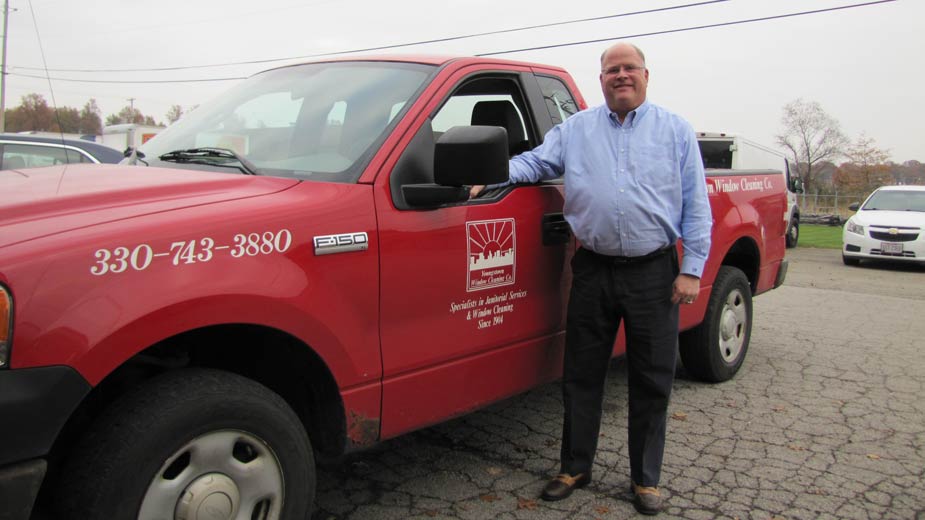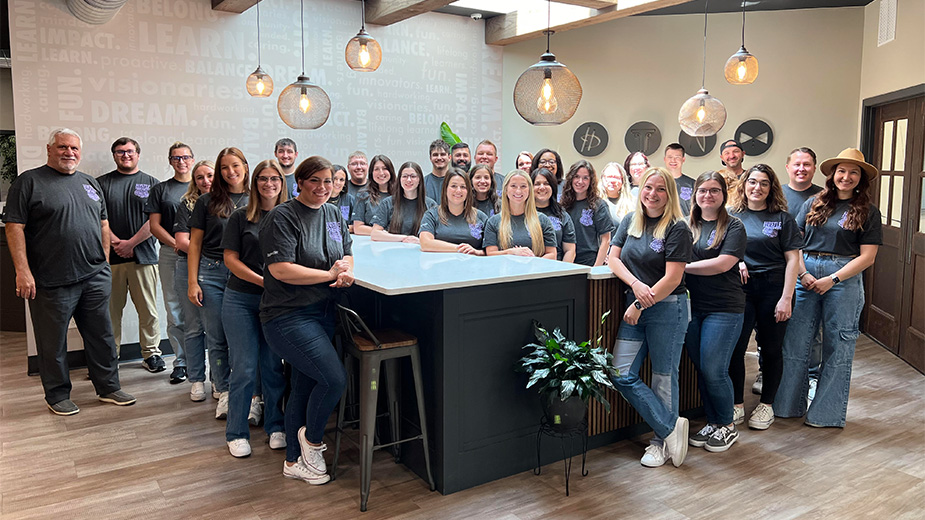Youngstown Cleaning Co. Makes Clean Sweep for 114 Years
YOUNGSTOWN, Ohio — At nine floors up, cleaning the windows of the former Dollar Bank Building in downtown Youngstown isn’t for everybody. Gary Barker, operations manager for Youngstown Cleaning Co., remembers the day when a co-worker was paralyzed with fright at the top floor.
“That particular job paid more money and he wanted to do it,” Barker says. “We just went up and he couldn’t even clean the windows on the way down he was frozen so bad.”
Barker didn’t hold it against him. The man, then in his 20s, had been cleaning windows only six months and so was relatively new. Barker, on the other hand, had been with Youngstown Cleaning Co. since he was 16.
Now 61, Barker still cleans windows, both commercial buildings and residences, but he’s also responsible for training new workers. From ensuring that windows are properly cleaned to maintaining good relationships with customers, he tries to instill the same lessons he learned 45 years ago under Milton Altman, then the owner.
The Altman family has owned and operated Youngstown Cleaning nearly 114 years. Max Webber founded it in 1904 and his son-in-law, Milton Altman, succeeded him. Milton’s sons, Alan and Charles “Buddy” Altman, took over the company, renaming it Youngstown Cleaning Co. and expanded into a full array of cleaning services. About 17 years ago, they handed the reins to Alan’s son, Steve Altman, today president and CEO.
“They’re probably one of the best families I’ve ever worked for,” Barker says. “I never thought I’d be doing it this long.”
Youngstown Cleaning is one of three such businesses that Steve Altman owns – the other two being All-Pro Cleaning Services Inc. in Solon and All Clean Window & Gutter Cleaning in North Canton. He started All-Pro in 1985 after graduating from Kent State University.
The fourth-generation company owner says the janitorial and cleaning industry has changed considerably over the last 30 years. He recalls working with his father when he was in high school and the company had eight trucks and as many as 18 window cleaners working in downtown Youngstown alone. Today, he gets the job done with one full-time and one part-time employee.
“The window cleaner is a dying breed,” he says. “Workers’ Compensation claims have driven up the cost, making it unaffordable for some.”
The larger downtown customers – banks, specifically – used to have their windows cleaned twice a week. Today, they’re more likely to get them done twice a month, he says.
While cleaning windows remains an important part of the business and has expanded to include regional universities, local school districts and health-care providers, commercial and residential cleaning services are in higher demand. Retention, he says, is key.
“We still have customers that go back four generations with us, since the 1900s,” he says. “We still have homes on Wick Avenue that we’ve been cleaning for 60 or 70 years.”
During the shale boom of the 2000s, the company had a great deal of business downtown. When gas prices dropped, “fracking closed up overnight,” costing the company about 15% to 20% of its commercial business, Altman says. But an increase in local manufacturing has helped make up the difference.
Locally, his commercial customers are a 50/50 split between office and industrial, with some 70 employees cleaning as many as 140 locations per night. Altman employs both full-time and part-time workers.
Different customers require different levels of cleaning. High-end law firms typically get higher-level services, including dusting, vacuuming, cleaning the bathrooms, wet mopping and polishing the floors. On the other hand, manufacturers are most concerned about maintaining the lavatories, he says.
As the company takes on more work with health-care providers, it requires its workers to undergo additional training in areas such as biomedical hazardous waste and blood borne pathogens. Improper cleaning can put the employee, as well as health- care providers and patients at risk, he says, citing staph infections as a potential result.
Medical buildings require specific cleaning chemicals and equipment. Each exam room gets a fresh bucket of cleaning water and the associate uses a flat mop. After cleaning, the mop head is discarded and a new one attached for the next room. Workers use black lights to inspect each room for bacteria, which glow under the light.
Youngstown Cleaning employs some of the latest cleaning methods and equipment so it can offer a “more educated way of cleaning.” About 90% of chemicals used are green and modern equipment alleviates the need for workers to physically touch anything in a bathroom. A Kaivac cleaner pressure washes the toilets, tile walls and floors, then dries them.
“It comes with a wet vac built into it,” he says. “You vacuum everything up and you’ve got a bathroom that’s immaculate.”
Because of the associated chemical and operating expenses, Altman offers Kaivac cleaning as an add-on service. Depending on the size of the restroom, the device can reduce labor by 25%. But the biggest difference is in the quality of the cleaning.
“Every inch of that porcelain is wet, disinfected and cleaned, along with the floors, sinks and countertops,” he says. “The end result is night and day.”
While new equipment improves the end result, it comes with a higher initial investment. Propane-fueled floor buffers cost around $3,500 but are preferred over electric floor buffers, which can cost between $800 and $900.
Modern floor scrubbers can cover a swath up to 36 inches wide, compared to 20 inches on the previous models, thus covering more floor space. This reduces man-hours, which cuts into revenue for hourly jobs, making it a challenge to recoup those higher equipment investments.
However, what it costs in higher expenses is made up in customer retention. Customers want the more efficient, more effective services. Cleaning companies that don’t make the investment in their equipment “will be left behind,” Altman says.
Technology is also playing a larger role in janitorial services. Some of Altman’s larger customers in Greater Cleveland employ Wi-Fi-powered dispensers for toilet paper, paper towels and liquid hand soap. When levels reach 10%, the dispensers alert the building superintendent and the on-site day matrons on their smartphones or tablets. This technology is ideal for buildings with at least 80,000 square feet and a few hundred people, he says.
“That is the next generation of bathroom cleaning,” he says. “It’s just coming out in the market now.”
Youngstown Cleaning employs some wireless technology of its own. All managers have smartphones and tablets they use to track associate time, location and safety, he says. The software also lets managers create post-inspection punch lists that show what work was done, thus providing greater accountability.
“In this industry, you’re only as good as what you did last night,” he says. “Customers remember what you didn’t clean last night.”
Aside from the latest equipment and chemicals, Altman says his most important investment is his workers. The 200-plus he employs at his three companies are integral to his ability to retain accounts because they help build and sustain rapport with the customers.
“I guarantee you, most presidents of any company know who their cleaning person is,” he says. “They see that person every night.”
In the five years that The Exal Corp. has contracted with Youngstown Cleaning, Kim Gardner, an account manager there, has gotten to know the cleaner, Lynn Smith, over the last year. Smith and Youngstown Cleaning “go above and beyond” to ensure the offices are kept clean, she says.
 Above: Lynn Smith cleans the offices of The Exal Corp. in Youngstown.
Above: Lynn Smith cleans the offices of The Exal Corp. in Youngstown.
“Anything we need from them, they’re on top of it,” Gardner says. “We have customers coming in from all over the world every day, and we wouldn’t want to take a chance of having something not be clean.”
Smith, who is approaching retirement, cleans the office building everyday, which includes about 40 carpeted offices, two kitchens and five restrooms. Exal works with Smith’s schedule, which is usually from 11 a.m. to 3 p.m.
“If I need her to come in earlier or stay later, she does,” Gardner says. “If she needs to leave, [Youngstown Cleaning] sends someone over so we’re never without a cleaning crew.”
Workers are cross-trained should a regular cleaner need a day off, Altman says. Most of the company’s employees have full-time jobs or are retired and do the work for extra money, so he works to maintain a positive working environment.
“No one wakes up and says, ‘I can’t wait to go clean those 40 toilets tonight,’ ” he says. “You better make sure that person feels important in your company. Or you’re not going to get the quality that you need to have done.”
Altman credits the local labor force for his company’s success and says his annual turnover rate is less than 4%, “which is unheard of in our industry.” Most employees are referrals, as well as children and grandchildren of past employees. In addition to paying above minimum wage, Altman offers incentives and recognition for employees who are on time, pleasant and build a rapport with the customers.
“The current employee that’s here, that’s made Youngstown their home, that has children who are going to school – that’s the best candidate,” he says. “Those are the success stories.”
Pictured at top: Steve Altman, president and CEO of Youngstown Cleaning Co., is the fourth generation of his family to operate the company.
Copyright 2024 The Business Journal, Youngstown, Ohio.


